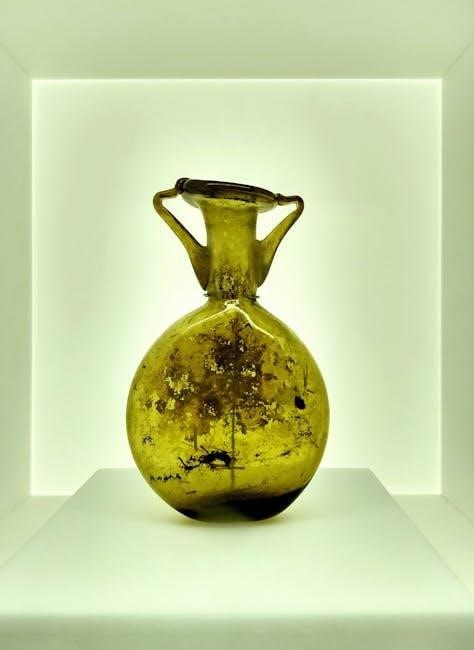A History of the World in Six Glasses by Tom Standage explores global history through six beverages‚ revealing their profound impact on human civilization and culture․
Overview of the Book “A History of the World in Six Glasses”
Tom Standage’s A History of the World in Six Glasses offers a unique perspective on global history by tracing the influence of six key beverages: beer‚ wine‚ spirits‚ coffee‚ tea‚ and Coca-Cola․ Each drink represents a distinct era‚ from ancient Mesopotamia to modern times‚ and serves as a lens to explore cultural‚ economic‚ and political transformations․ The book weaves engaging anecdotes and meticulous research to illustrate how these drinks shaped civilizations‚ fueled empires‚ and sparked revolutions‚ providing a fascinating narrative of human progress and interconnectedness․
The Concept of Using Beverages to Explore World History
By examining six iconic beverages—beer‚ wine‚ spirits‚ coffee‚ tea‚ and Coca-Cola—Tom Standage crafts a compelling narrative of global history․ Each drink serves as a lens to explore pivotal moments‚ cultural shifts‚ and economic transformations․ From ancient civilizations to modern globalization‚ these beverages reveal how everyday items have shaped human societies․ This innovative approach makes history accessible and engaging‚ offering fresh insights into how seemingly simple drinks have influenced the course of human events and interconnected cultures worldwide․

Beer: The Birth of Civilization
Beer played a crucial role in early civilizations‚ particularly in Mesopotamia and Egypt‚ serving not only as a staple drink but also in religious rituals and trade‚ influencing daily life and social structures․

The Role of Beer in Ancient Mesopotamia and Egypt
Beer was more than just a drink in ancient Mesopotamia and Egypt; it was a staple of daily life‚ used in religious rituals‚ and even as a form of currency․ In Mesopotamia‚ beer was brewed from barley and fermented with honey‚ often enjoyed by both the elite and commoners․ Similarly‚ in Egypt‚ beer was a dietary mainstay‚ consumed for nutrition and as part of religious offerings to gods․ Its production and distribution played a significant role in shaping early agricultural practices and social structures‚ highlighting its cultural and economic importance in these civilizations․
How Beer Influenced Early Agricultural Practices
Beer’s significance extended beyond consumption‚ as its production drove early agricultural innovations․ The need for stable grain supplies‚ particularly barley‚ led to the domestication of crops and organized farming․ Surplus grain from agriculture supported growing populations and specialized labor‚ fostering the rise of complex societies․ The reliance on beer also influenced the development of irrigation systems‚ ensuring consistent water supplies for crops․ This interplay between brewing and farming laid the foundation for civilization’s growth‚ highlighting beer’s role as both a catalyst and a cornerstone of early agricultural progress․

Wine: The Drink of the Gods
Wine played a central role in ancient Greek and Roman cultures‚ serving as a symbol of wealth‚ religion‚ and intellectual pursuits‚ shaping their societies and traditions deeply․
Wine in Ancient Greece and Rome
Wine was a cornerstone of ancient Greek and Roman life‚ serving as a staple beverage and a symbol of culture․ In Greece‚ wine was associated with Dionysus‚ the god of fertility and theater‚ and was often consumed during symposia‚ where intellectual discussions flourished․ The Greeks also used wine for medicinal purposes and as a form of currency in trade․ In Rome‚ wine production expanded significantly‚ with vineyards spreading across the empire․ It became a daily drink for Romans‚ fostering social and political connections‚ and was integral to their culinary and cultural traditions․
The Cultural and Religious Significance of Wine
Wine held profound cultural and religious significance in ancient civilizations․ In Greek religion‚ it was associated with Dionysus‚ the god of wine and festivities‚ symbolizing ecstasy and divine connection․ The Romans later adopted Bacchus as their wine deity‚ embedding it into their rituals and ceremonies․ Wine also played a central role in Christian traditions‚ becoming a symbol of sacrifice and communion․ Its cultural influence extended to art‚ literature‚ and social practices‚ solidifying its place as a defining element of Western civilization and spiritual expression․
Spirits: The Age of Exploration
Spirits emerged as a key factor during the Age of Exploration‚ serving as currency‚ fueling conquest‚ and shaping global trade‚ linking empires and cultures across oceans․
The Rise of Spirits During Colonial Times
Spirits became central to colonial economies‚ serving as currency‚ medicine‚ and a tool for negotiation․ Their production and trade fueled exploration‚ conquest‚ and cultural exchange‚ reshaping global power dynamics․ Distilled beverages like rum and brandy were integral to naval expeditions and labor systems‚ while also fostering social hierarchies and dependencies․ This era marked the beginning of spirits’ profound influence on international relations and the global economy‚ creating lasting legacies in commerce and culture․ Spirits were not just drinks but agents of transformation in a rapidly interconnected world․
The Role of Spirits in Global Trade and Conquest
Spirits became a global commodity‚ driving trade networks and fueling colonial ambitions․ They facilitated the colonization of the Americas‚ Africa‚ and Asia‚ serving as currency‚ lubricating diplomacy‚ and financing wars․ The production and exchange of rum‚ brandy‚ and other distilled beverages shaped economies‚ influenced power structures‚ and connected distant cultures․ Spirits also funded the transatlantic slave trade and imperial expansion‚ leaving a lasting impact on global dynamics․ Their role in conquest and trade underscored their significance as a driving force in shaping the modern world․
Coffee: The Spark of Revolution
Coffee emerged as a catalyst for intellectual and political change‚ fueling revolutions and the Enlightenment through its role in fostering discourse in coffeehouses across Europe․
Coffeehouses as Centers of Intellectual and Political Change
Coffeehouses became vibrant hubs for intellectual and political discourse‚ fostering the exchange of ideas during the Enlightenment․ They attracted philosophers‚ scientists‚ and revolutionaries‚ creating spaces for debate and innovation․ These gatherings laid the groundwork for modern democracy by encouraging free expression and challenging traditional authority․ The stimulating environment of coffeehouses played a pivotal role in shaping revolutionary movements‚ as thinkers like Voltaire and Rousseau shared their ideas‚ influencing societal change and the rise of new political ideologies․
The Impact of Coffee on the Enlightenment and Modern Society
Coffee’s stimulating effects fueled the Enlightenment’s intellectual surge‚ enabling thinkers to engage in prolonged debates and innovative ideas․ Its widespread consumption across Europe transformed work habits‚ promoting productivity and reducing alcohol’s dominance․ The shift from ale to coffee improved mental clarity‚ fostering a culture of reason and progress․ This beverage became a symbol of modernity‚ driving societal changes that laid the foundation for democratic values and the rise of a more egalitarian world‚ shaping the course of human history in profound ways․
Tea: The Fuel of Empire
Tea became a cornerstone of British culture and empire‚ driving global trade‚ shaping colonial ambitions‚ and fueling economic growth through the East India Company’s vast networks․
Tea and the Rise of the British Empire
Tea played a central role in the expansion of the British Empire‚ fueling trade and cultural exchange․ Its popularity in Britain grew rapidly‚ becoming a staple of daily life and a symbol of prosperity․ The East India Company dominated the tea trade‚ establishing colonies and shaping global commerce․ Tea’s influence extended beyond economics‚ fostering political ties and cultural identity․ Its significance was so great that conflicts over tea taxation sparked pivotal events‚ such as the Boston Tea Party‚ marking the beginning of a new era in world history․
The Boston Tea Party and Its Historical Consequences
The Boston Tea Party was a pivotal protest against British taxation‚ where colonists dumped hundreds of chests of tea into the harbor․ This act of defiance directly challenged British authority and sparked retaliation through the Intolerable Acts‚ which severely restricted colonial rights․ The event galvanized resistance across the colonies‚ uniting them against British rule and setting the stage for the American Revolution․ Tea‚ once a symbol of British prosperity‚ became a catalyst for the fight for independence‚ forever linking it to the birth of a new nation․

Coca-Cola: The Globalization of Taste
Coca-Cola symbolizes the globalization of taste‚ spreading from its 19th-century origins in Atlanta to become a worldwide phenomenon‚ embodying cultural homogenization and modern consumer culture․
The Invention of Coca-Cola and Its Cultural Significance
Coca-Cola was invented in the late 19th century by John Pemberton as a medicinal tonic‚ later popularized by Asa Griggs Candler․ It became a cultural icon‚ symbolizing American ingenuity and globalization․ The drink’s unique bottle design and memorable advertising campaigns helped it spread worldwide‚ embedding it in popular culture․ Coca-Cola’s rise reflects the intersection of capitalism‚ technology‚ and consumerism‚ making it a powerful symbol of modern globalization and cultural homogenization․ Its impact extends beyond taste‚ influencing marketing and societal trends globally․
Coca-Cola as a Symbol of Modern Globalization
Coca-Cola embodies modern globalization‚ transcending cultural and geographical boundaries․ Available in nearly every country‚ it adapts to local tastes while maintaining a unified brand identity․ The drink’s global reach reflects the spread of American culture and consumerism․ Its iconic branding and marketing strategies have made it a recognizable symbol worldwide․ However‚ its dominance has also sparked debates about cultural homogenization and environmental impact․ Coca-Cola’s success underscores the power of globalization in shaping modern commerce and culture‚ illustrating how a single product can influence societies globally․
A History of the World in Six Glasses masterfully connects six beverages to major historical developments‚ revealing how drinks shaped civilization‚ culture‚ and global interconnectedness over centuries․
Reflections on the Six Drinks That Shaped the World
From beer in ancient Mesopotamia to Coca-Cola’s global dominance‚ each drink reflects the cultural‚ economic‚ and social dynamics of its era․ Beer fostered civilization‚ wine shaped religion and philosophy‚ spirits fueled exploration‚ coffee ignited revolutions‚ tea built empires‚ and Coca-Cola symbolized modern globalization․ Tom Standage’s narrative weaves these beverages into a compelling tapestry‚ showcasing how they influenced human progress and interconnectedness․ This unique perspective offers a fresh understanding of history‚ highlighting the enduring impact of everyday drinks on the world’s development․
